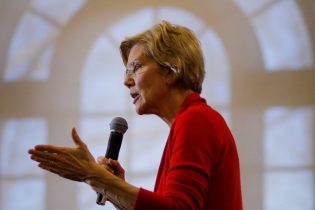
January 10, 2019
By Sarah N. Lynch and Andy Sullivan
WASHINGTON (Reuters) – President Donald Trump’s nominee for U.S. attorney general is expected to tell a Senate panel next week that he supports a new law easing prison sentences for some criminals, even though he advocated for decades for just the opposite.
William Barr for much of his career championed a get-tough approach to crime that has recently lost favor, culminating last month in Trump signing into law the biggest overhaul of the criminal justice system in a generation.
The First Step Act, enacted with strong bipartisan support in Congress, reduces mandatory minimum sentences for some nonviolent, low-level offenders and makes it easier for prisoners to qualify for early release to halfway houses or home confinement.
Trump signed it into law just weeks after he nominated Barr, who issued a report during an earlier stint as attorney general in the 1990s called “The Case for More Incarceration.”
Barr is expected to say that he will support the new law when he appears before the Senate Judiciary Committee for confirmation hearings next week, according to two sources familiar with his preparations.
“We believe that Barr’s position will be somewhat moderated when he testifies if for no other reason than that his boss (Trump) fully subscribes to the First Step approach,” said Fraternal Order of Police executive director Jim Pasco, who said he had been in touch with people helping Barr prepare for the Senate hearings.
The Senate, controlled by Trump’s fellow Republicans, is expected to confirm Barr’s nomination to again head the Justice Department.
OVERSHADOWED BY MUELLER
Concerns about Barr’s record on criminal justice have so far taken a back seat to questions about how he would handle Special Counsel Robert Mueller’s investigation into possible collusion between Russia and the Trump campaign in the 2016 election. Trump has denied any collusion with Moscow and Russia has said it did not meddle in the election.
Republican Senator Lindsey Graham, the incoming chairman of the Judiciary Committee, said he did not discuss the First Step Act when Barr visited him at his office on Wednesday. “That would have been a good question to ask him,” Graham said after the meeting.
But criminal justice advocates said they were working with lawmakers on the committee to make sure Barr will be questioned in detail about specific elements of the new law to ensure that he will support it.
“It certainly appears he holds an old-school view of our criminal justice system, but there is an overwhelming majority of members of the House and Senate on both sides of the aisle who do not feel that way,” said Holly Harris, executive director of Justice Action Network, a coalition of criminal-justice groups across the political spectrum.
Another advocate, speaking on condition of anonymity, said it was unlikely Trump would have nominated Barr without a commitment to support the First Step Act.
‘EXTREMELY TROUBLING’
Democratic Senator Cory Booker, a member of the Judiciary Committee, is among those worried that Barr’s views on mass incarceration have not evolved since the 1990s, spokeswoman Kristin Lynch said.
Democratic Senator Chris Coons, also a member of the panel, told Reuters in a statement he too has concerns.
“I am concerned about comments that William Barr has made in the past that fail to appreciate the problems created by mass incarceration and the racial inequities in the criminal justice system,” he said.
“The President’s nominee for attorney general should demonstrate in his hearing next week that he will fully and efficiently implement the First Step Act.”
As attorney general, Barr would be in a position to influence how prisoners would be released into halfway houses or home confinement.
“It’s frustrating to think we might have found one of the few people who are still stuck in the 1980s and 1990s on these issues,” said Kevin Ring, head of Families Against Mandatory Minimums, which has worked to reduce minimum prison terms.
Barr was attorney general in 1991-1993, a time when U.S. crime rates reached an all-time high of 758 incidents per 100,00 people. They have since fallen by nearly half, to a rate of 394 incidents per 100,000 people in 2017, according to the FBI.
At that time, Barr advocated long prison sentences to keep violent criminals off the streets. “First, prisons work. Second, we need more of them,” Barr’s Justice Department wrote in a 1992 report.
Barr maintained his get-tough stance after leaving office. Along with other former law enforcement officials, he lobbied against earlier versions of the First Step Act in 2014 and 2015.
When Trump fired Attorney General Jeff Sessions in November, Barr and two other former attorneys general penned a Washington Post opinion piece that praised Sessions for directing prosecutors to pursue the severest penalties possible.
Barr’s advocacy came as others were concluding that mandatory minimum sentences and other tough policies had taken too harsh a toll, especially on African-Americans and Latinos, and were costing taxpayers too much money.
(Reporting by Sarah Lynch and Andy Sullivan, Editing by Kevin Drawbaugh and Rosalba O’Brien)



























